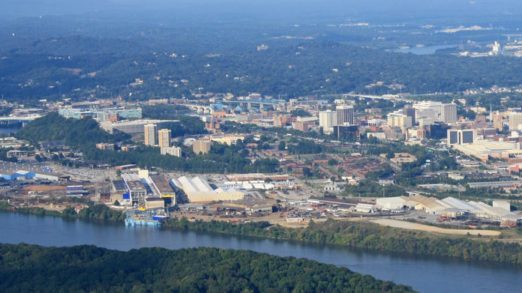Southeast CASC Initiates Four New Actionable Science Projects During FY18

Research funded by the SE CASC encompasses a range of science activities that contribute to understanding the exposure and impacts of global change on resources that matter to our partners and to framing decisions about adaptation strategies, emphasizing principles of co-produced actionable science. Science funding decisions are guided by annual science priorities developed with input from key federal, state, and tribal partners in the Southeast.
The Southeast CASC is excited about our new projects to address management questions in the region. A total of ten SE CASC funded projects have been initiated in fiscal year 2018, addressing science topics varying from impacts on wildlife and plants to communicating future sea-level rise scenarios. You can view the first six projects to commence here. The work conducted under these projects supports the Secretary of Interior’s priority to create a conservation stewardship legacy by using science to identify best practices to manage land and water resources and adapt to changes in the environment. Project information including which SE CASC researchers are Principal or Co-Investigators leading the project, anticipated end dates, and a description of the project are provided below.

Effects of Urbanization on the Conservation Value of Forests
Principal Investigator(s): Steven Frank, North Carolina State University
Start Date: April 2019
Expected End Date: April 2020
Urbanization in the Southeast U.S. represents a primary threat to threatened and endangered species. As urbanized areas expand, they encroach on preserved areas and fragment forests. Forests located next to cities are exposed to high temperatures, pollution, pests, invasive plants, and other factors that threaten forest health. However, forests located within urban and suburban areas – “urban forests” support diverse plant and animal life, and could play an increasingly important role in conservation as urbanization continues. This project will synthesize information on how higher temperatures and pollution affect urban forest habitat quality, identify knowledge gaps that impede forest management, and propose future research directions to fill those gaps.
To view a full project summary click here.

Enhancing Coastal Adaptation Planning at Gulf Islands National Seashore
Principal Investigator: Erin Seekamp, NC State University
Cooperator/Partners: Xiao Xiao, North Carolina State University; Max Post van der Burg, Northern Prairie Wildlife Research Center; Mitchell Eaton, Southeast Climate Adaptation Science Center
Start Date: April 2019
End Date: April 2020
Barrier islands are exposed to a range of natural and human-caused changes, including hurricanes, sea-level rise, and dredging. Gulf Islands National Seashore is primarily comprised of barrier islands and faces challenges in managing natural and cultural resources due to these processes. This project will support efficient adaptation planning of vulnerable coastal resources and identify research priorities that will help predict future changes. Researchers will implement a framework designed to make effective adaptation decisions under budget constraints, evaluate the information needs related to sediment dynamics in the region, and explore paths forward for addressing needs.
To view a full project summary click here.

Improving Scenarios of Future Patterns of Urbanization, Climate Adaptation, and Landscape Change in the Southeast
Principal Investigator: Ross Meentemeyer, North Carolina State University
Cooperator/Partners: Adam Terando, Southeast Climate Adaptation Science Center; Georgina Sanchez, North Carolina State University
Start Date: April 2019
End Date: April 2022
As human populations grow, demand for urbanized areas will increase, and scientists can help natural resource managers plan for these changes by creating models that predict patterns of future urbanization. This project will build on prior efforts to develop more comprehensive scenarios of future urbanization patterns in the Southeast. The scenarios will consider the increasing redistribution of people from coastal and low-lying areas as they become more vulnerable to the effects of climate change and the existing migration flows from other parts of the country into the Southeast. The resulting scenarios and maps of potential future urban change will allow natural resource decision makers to visualize and anticipate hotspots of urbanization and population movement across the region.
To view a full project summary, click here.
The Future of Culturally Important Species in North America
Principal Investigator: Rob Dunn, North Carolina State University
Co-Investigators: Dominique David-Chavez, Colorado State University; Michael C. Gavin, Colorado State University; Matt Fitzpatrick, University of Maryland Center for Environmental Science
Start Date: April 2019
End Date: April 2020
Global change is leading to major shifts in the abundance, distribution, and life history of species that are important to the Indigenous peoples of North America. This has concomitant effects on their value to the peoples for whom they are the most important. Using an approach known as climate-analogue mapping, researchers will examine regions currently experiencing the specific climate conditions that are expected to be experienced on tribal lands in the future, as a means of forecasting potential future climate conditions for tribal lands. A tribal needs assessment listening session will also be conducted to determine which species and phenomena should be studied, at what scale they should be studied, and what scale management decisions would be most relevant to tribes.
To view a full project summary, click here.
- Categories:
